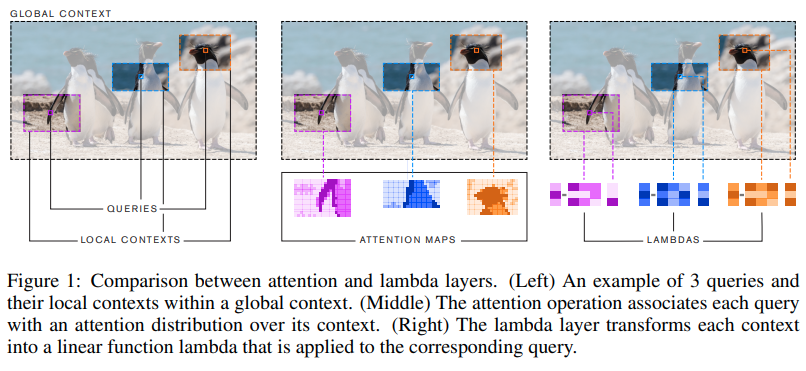Implementation of λ Networks, a new approach to image recognition that reaches SOTA on ImageNet. The new method utilizes λ layer, which captures interactions by transforming contexts into linear functions, termed lambdas, and applying these linear functions to each input separately.
$ pip install lambda-networksGlobal context
import torch
from lambda_networks import LambdaLayer
layer = LambdaLayer(
dim = 32, # channels going in
dim_out = 32, # channels out
n = 64 * 64, # number of input pixels (64 x 64 image)
dim_k = 16, # key dimension
heads = 4, # number of heads, for multi-query
dim_u = 1 # 'intra-depth' dimension
)
x = torch.randn(1, 32, 64, 64)
layer(x) # (1, 32, 64, 64)Localized context
import torch
from lambda_networks import LambdaLayer
layer = LambdaLayer(
dim = 32,
dim_out = 32,
r = 23, # the receptive field for relative positional encoding (23 x 23)
dim_k = 16,
heads = 4,
dim_u = 4
)
x = torch.randn(1, 32, 64, 64)
layer(x) # (1, 32, 64, 64)For fun, you can also import this as follows
from lambda_networks import λLayerShinel94 has added a Keras implementation! It won't be officially supported in this repository, so either copy / paste the code under ./lambda_networks/tfkeras.py or make sure to install tensorflow and keras before running the following.
import tensorflow as tf
from lambda_networks.tfkeras import LambdaLayer
layer = LambdaLayer(
dim_out = 32,
r = 23,
dim_k = 16,
heads = 4,
dim_u = 1
)
x = tf.random.normal((1, 64, 64, 16)) # channel last format
layer(x) # (1, 64, 64, 32)@inproceedings{
anonymous2021lambdanetworks,
title={LambdaNetworks: Modeling long-range Interactions without Attention},
author={Anonymous},
booktitle={Submitted to International Conference on Learning Representations},
year={2021},
url={https://openreview.net/forum?id=xTJEN-ggl1b},
note={under review}
}